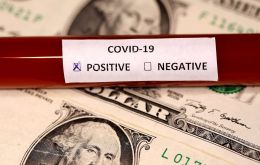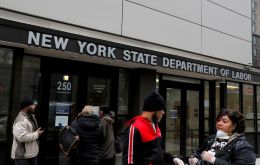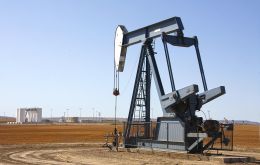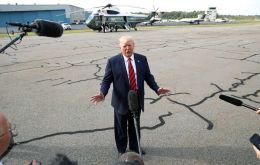MercoPress. South Atlantic News Agency
Tag: US economy
-
Tuesday, April 7th 2020 - 07:50 UTC
COVID-19 hits hard US economy, with millions of jobs lost, but the dollar remains king

The COVID-19 outbreak in the United States has caused millions of people to lose their jobs and brought the economy to its knees but it has not dethroned the American dollar. On the contrary, the currency has risen in value this year, gaining six percent from its lowest point reached in early March, according to the US dollar index, which measures the greenback's value against a basket of other currencies.
-
Saturday, April 4th 2020 - 08:18 UTC
Record unemployment filing in US in two weeks; “economy has slipped into recession”

The number of Americans filing claims for unemployment benefits shot to a record high of more than 6 million last week as more jurisdictions enforced stay-at-home measures to curb the coronavirus pandemic, which economists say has pushed the economy into recession.
-
Wednesday, January 29th 2020 - 08:10 UTC
Solid growth of US economy this year, but with increasing federal budgets

The U.S. economy will grow at a “solid” rate of 2.2% this year, the non-partisan Congressional Budget Office forecast on Tuesday, but with federal budget deficits hitting US$1.015 trillion.
-
Friday, January 10th 2020 - 09:50 UTC
Fed members confident about the US economy in 2020: headwinds abating

The global trade wars may not be over, but U.S. Federal Reserve officials on Thursday said the economy may have weathered the worst of it as risks begin to ease and businesses adjust to a new trade environment.
-
Saturday, October 5th 2019 - 09:37 UTC
US unemployment at a record 50-year low in September, but manufacturing fell sharply

The U.S. unemployment rate dropped to near a 50-year low of 3.5per cent in September, with job growth increasing moderately, suggesting the slowing economy could avoid a recession for now despite trade tensions that are hammering manufacturing.
-
Thursday, September 26th 2019 - 13:35 UTC
What is the economic fallout from the Saudi Arabia oil facility attack?

A violent attack on Saudi Arabia’s oil infrastructure was carried out earlier this month. Some 18 drones and seven cruise missiles were reportedly fired in the direction of several oil facilities in the region. The Abqaiq facility was the primary location of attack, while cruise missiles struck an oilfield in Khurais, just east of the city of Riyadh.
-
Saturday, August 31st 2019 - 08:50 UTC
Trump again blasts the Fed over inaction as the Euro slides against the dollar

United States President Donald Trump on Friday accused the U.S. Federal Reserve Bank of inaction as the Euro slid in value against the dollar, something he said gave European countries a big trade advantage.
-
Wednesday, August 21st 2019 - 09:48 UTC
The word that begins with “R” that scares Donald Trump

United States President Donald Trump on Tuesday insisted that recession - a potentially dangerous blow to his re-election next year - is not in the cards. But he indicated he's preparing just in case.
-
Wednesday, August 7th 2019 - 08:50 UTC
United States need an independent Federal Reserve

The following article was published 6 August, in the Wall Street Journal, signed by ex-Fed chiefs Paul Volcker, Alan Greenspan, Ben Bernanke and Janet Yellen. Basically, it states that the US economy functions best when the central bank is free of short-term political pressures.
-
Saturday, July 27th 2019 - 09:52 UTC
Consumers help US economy to remain strong but business investment contracts

US economic growth slowed less than expected in the second quarter as a surge in consumer spending blunted some of the drag from declining exports and a smaller inventory build, which could further allay concerns about the economy's health.
